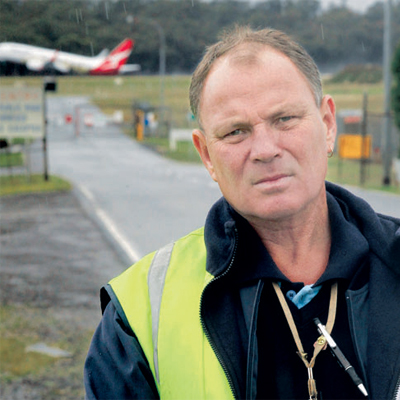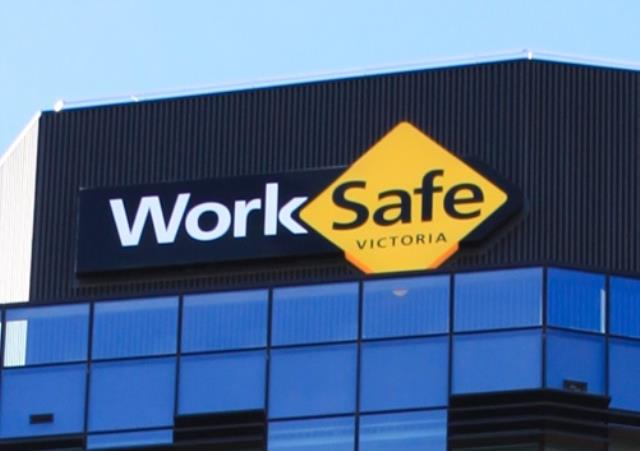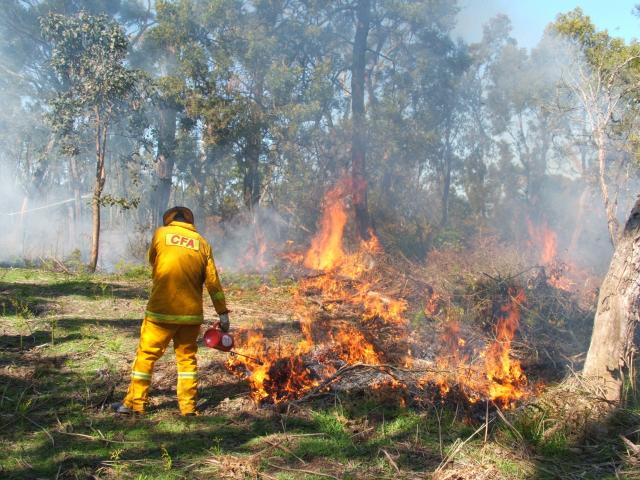Cut, hacked, sliced and packaged … whether it’s smallgoods processors or Qantas staff, the proverbial, or actual tap, on the shoulder from the boss indicating ‘it’s over’ usually comes as a blow to self-confidence, even to the sense of ‘self’, as Robert Fedele reports.
‘‘I WAS the last of them to go,’’ says Michael Oravec, referring to the clinical dismantling of Altona’s iconic Don Smallgoods plant, which had been operating since the ’50s.
In late July, 2008, the company dropped a grenade on its loyal workforce, announcing the axing of 400 jobs and the end of manufacturing at its Altona base from 2010. Some of those staffers had called the plant home for three decades.
‘Don’ blamed losses in the millions as the reason for switching focus to expansion of its Castlemaine production works.
Michael Oravec was 53 and a respected team leader who had worked at Don for 30 years.
On the day word broke, with media circling like seagulls on the perimeter, the burly man marched outside his ‘‘second home’’ and onto the footpath, huffing and puffing with raw emotion.
‘‘We were absolutely shocked. A number of people have been crying today,’’ he said at the time.
‘‘We were the only ones making money. The company indicated we would be staying, even though we suspected it was a matter of time before they pulled the plug and went elsewhere.’’
Four years on, grounded in his Hoppers Crossing home, Oravec is still coming to terms with the impact of losing his job and making his way in an uncertain world.
He no longer feels angry, his resentment fading over time like a balloon leaking air.
The plant began culling heads about a year after the announcement. Oravec saw it out until the very end and called it a day in August last year.
‘‘It wasn’t a good feeling I can tell you that,’’ he says of the sequence of events that unfolded on that cold, wintry day.
‘‘But then we stayed there and worked as though nothing had happened for a year … year and a half … and then it started.’’
The redundancy package he received equalled four weeks’ pay for each year of service, capped at 13 years. Any year worked after that got you about $600.
Oravec deemed the package satisfactory but says it has done little to alleviate his current situation.
He’s been out of a job since leaving Don and is struggling to re-enter the workforce. ‘‘The money will run out eventually and what am I going to do after that?’’
He acknowledges many of his former workmates have experienced a similar fate.
‘‘Some of them have found jobs, but most of them aren’t happy,’’ he says. ‘‘They’ve found casual work here and there, but they haven’t worked in one place; none of them as far as I know.’’
Oravec can drive a forklift and semi-trailer and has seemingly appealing experience to potential employers.
He’s contacted several recruitment agencies and left his details. His 25-year-old son Michael junior helps him use the internet to make job applications.
‘‘We’re applying … but,’’ Michael junior says, stopping short with a grimace.
On the other side of Altona where Oravec worked, car manufacturer Toyota too slashed hundreds of jobs without fanfare earlier this year.
Oravec shows sympathy for workers when discussing the fresh spike in job losses. But reality soon kicks in and he can’t help but think of his own future.
‘‘It’s another kick in the guts because they’re all competing against you when you look for a job.’’
Fadi Hassan was one of the chosen ones. The Toyota employee was among 350 workers who lost their jobs in April.
The job cuts had been flagged for months, but employees had no idea when or how it would happen, later reporting how they had been literally tapped on the shoulder.
A senior shop steward, Hassan had worked for the company for 16 years, starting on the production line.
His role with the union meant he was privy to discussions involving the foreshadowed sackings.
He, like the employees he represented, knew it was coming. He just didn’t know he’d be one of them.
Workers were plucked out in groups of threes and fours and escorted over the road where they were told the grim news.
‘‘Nobody had a chance to say anything or do anything,’’ Hassan recounts. ‘‘I saw men broken — in tears in there. I was marching with my people across the road,’’ he adds proudly.
‘‘I get there and got pulled up by the human resources manager and she goes, ‘Fadi, I’m sorry, but you have to go as well’.
‘‘It was a shock for me. Like someone had poured a bucket of cold water on my head.’’
In the aftermath, Hassan is one of 12 union delegates pursuing legal action against the company in the Federal Court, alleging union officials were targeted in the forced redundancies.
Of the 350 sackings, 25 of them were union delegates. The situation is yet to be resolved.
Hassan and his fellow aggrieved workers have since protested several times outside Toyota, even camping out in a caravan plastered with banners bearing slogans like, ‘Oh what, no feeling’ and ‘No respect’.
A father of four, with three of his children still living under his roof, Hassan says the redundancy package was ‘‘reasonable’’, but he’s fearful of what the future holds .
Telling his story in his Keilor Downs home, the anger in his voice grows.
‘‘The money’s gonna go. I’m 50. The truth is I’m going to be struggling to find a job. I have a mortgage and it’s not small. What am I going to do? I’m going to struggle. I better start thinking of alternatives from now.’’
The soap opera played out at Toyota is indicative of a wider issue facing the blue-collar worker.
In Melbourne’s west, the heartland of manufacturing, redundancies are becoming a distressingly familiar part of the landscape.
Terry Kennedy is the Local Employment Coordinator for North Western Melbourne, and one of 20 (LECs) across Australia charged with getting people made redundant back into the workforce.
Co-ordinators are typically placed into areas that fare worst in economic downturns.
Kennedy’s patch covers Melbourne’s west, stretching from Wyndham up to the north of Hume and Whittlesea. It’s arguably the most precarious.
‘‘To a degree, I suppose it’s the whole point of the job,’’ Kennedy says about his role in the thick of it. ‘‘[But] I didn’t think we’d get the numbers [job losses] that we’re seeing at the moment.’’
Kennedy’s job is a middle man of sorts. His focus is to pool resources together to help someone get their next job.
It includes liaising with state and federal contacts to find out which businesses are recruiting. Thus he identifies a pool of jobs that people can be linked to.
In many cases the system might include advice on upskilling or adapting, Kennedy using the example of someone perhaps changing from building cars to fixing aeroplane engines.
‘‘Our job is to keep those people in the game so when the other jobs do come around they’ve got an opportunity.’’
At Toyota, Kennedy ran a two-day seminar, in the same place workers were told they were no longer wanted, and he offered one-on-one support.
‘‘A lot of heads were spinning because there was no lead-up; it was just a tap on the shoulder,’’ he says. ‘‘That’s the worst way to be told you’re being made redundant.
‘‘[But] the Toyota workers were fantastic. Some of them were so pro-active, by the time they left our information session, within an hour they’d registered with a job service agency. Some of them had already got a job within 24 hours of being told how the system works.’’
Realistically though, Kennedy concedes most people will struggle and ‘‘it’s not a quick fix’’.
He adds that the impact of redundancy can carry on long after the dust has settled and lead to mental illness.
‘‘When all the hype’s gone and the initial surge of support is over, they feel very isolated because their friends have been associated with the job, their social life is wrapped around the job, and then they go to sitting at home.
‘‘Even if they don’t want to work, they might be 55, 56, and decide to take the package and retire. They still have the problem of having been very busy for 25 to 30 years and, bang, they’re doing nothing.’’
Qantas aircraft maintenance engineer Neil Kettle has sought a redundancy for several years, fed up with the working environment and uncertainty at the turbulent airline.
The 49-year-old says redundancies were laid out on the table several times in recent years, but he was left disappointed when nothing eventuated.
‘‘I’ve still got a package from four years ago that I’ve kept in my tool box unopened because I don’t want to tease or torment myself into saying, I’m going to get it. They’ve done it before and it’s demoralising getting knocked back.’’
In May, Qantas confirmed what had been whispered about for months, slashing 500 jobs in heavy maintenance at Tullamarine.
Kettle, of Aberfeldie, has worked for the airline for 23 years.
He reckons the company has gone backwards year by year.
‘‘We [the workers] were like a group. We went away together, things like that. And they’ve just come in and dismantled that and separated people, divided the company up within itself.’’
Kettle will take a redundancy and plans to travel around Australia in a motorhome planted in his driveway.
He’s unsure what the future holds, but doubts he will work in the aviation industry again.
‘‘The big reason [I want the package] is the way the company’s gone. You’re always on tenterhooks, worrying whether your job’s going to be there or not.
‘‘I’ll take my chances now, take the package, and move on.’’







